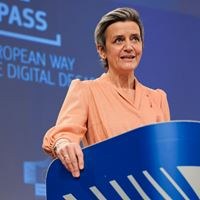(BRUSSELS) – The EU Commission set out a blueprint Tuesday for a Europe’s ‘digital transformation’, including multi-country projects, and preparing legislative proposals for a governance framework to monitor progress.
“Today’s paper is the start of an inclusive process,” said EC executive vice-president Margrethe Vestager said: “Together with the European Parliament, the Member States and other stakeholders, we will work for Europe to become the prosperous, confident and open partner that we want to be in the world. And make sure that all of us fully benefit from the welfare brought by an inclusive digital society.”
Digital technologies are seen as a key differentiating factor in a successful transition to a sustainable, post-pandemic economy and society.
The Commission is proposing a Digital Compass to translate the EU’s digital ambitions for 2030 into concrete terms. They evolve around four cardinal points:
- Digitally skilled citizens and highly skilled digital professionals; By 2030, at least 80% of all adults should have basic digital skills, and there should be 20 million employed ICT specialists in the EU while more women should take up such jobs;
- Secure, performant and sustainable digital infrastructures; By 2030, all EU households should have gigabit connectivity and all populated areas should be covered by 5G; the production of cutting-edge and sustainable semiconductors in Europe should be 20% of world production; 10,000 climate neutral highly secure edge nodes should be deployed in the EU; and Europe should have its first quantum computer;
- Digital transformation of businesses; By 2030, three out of four companies should use cloud computing services, big data and Artificial Intelligence; more than 90% SMEs should reach at least basic level of digital intensity; and the number of EU unicorns should double;
- Digitalisation of public services; By 2030, all key public services should be available online; all citizens will have access to their e-medical records; and 80% citizens should use an eID solution.
The Compass sets out a robust joint governance structure with Member States based on a monitoring system with annual reporting in the form of traffic lights. The targets will be enshrined in a Policy Programme to be agreed with the European Parliament and the Council.
Possible multi-country projects include a pan-European interconnected data processing infrastructure; the design and deployment of the next generation of low power trusted processors; or connected public administrations.
Digital principles include access to high quality connectivity, to sufficient digital skills, to public services, to fair and non-discriminatory online services and more generally, to ensure that the same rights that apply offline can be fully exercised online.
Promotion of a positive and human-centred digital agenda within international organisations will allow the EU to work with partners around the world in achieving common global objectives. Apart from a new EU-US Trade and Technology Council, the Communication highlights the importance of investing in improved connectivity with the EU’s external partners, for example through the creation of a Digital Connectivity Fund.
Europe’s Digital Decade guide
Europe’s Digital Decade Factpage
Communication “2030 Digital Compass: the European Way for the Digital Decade”


